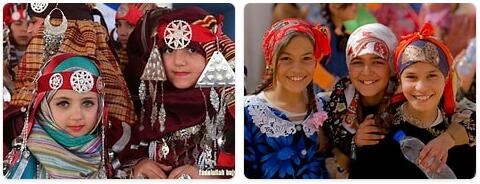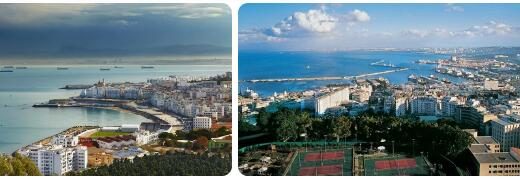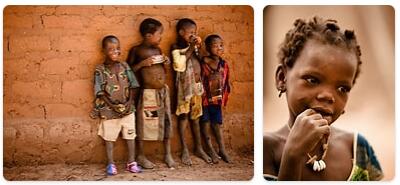Libya 2014
Yearbook 2014
Libya. Libya population in 2020 is estimated at 6,871,303. The security situation in the country continued to be unstable during the year and the situation was particularly difficult in the capital Tripoli, occupied by rival militia groups. In the second largest city of Benghazi, there were also fighting between military and Islamist militia. The widespread violence between various militant groups forced many people to flee their homes. According to the UNHCR, more than 100,000 people fled as a result of the unrest and the human rights organization Human Rights Watch also reported ongoing war crimes such as attacks on civilians, government officials and journalists. The violence was described as the worst since al-Khadaffi was overthrown three years earlier and some observers warned that Libya was once again entering a full-scale civil war.

In January, the Muslim Brotherhood’s Party of Justice and Reconstruction Party (JCP) left the government because of dissatisfaction with the country’s Prime Minister Ali Zidan, which JCP repeatedly tried to conduct a vote of no confidence in Parliament. In the same month, a Deputy Minister of Government was shot dead in the coastal city of Sirte and the acting Home Minister was later subjected to a murder trial in Tripoli.
Later in the spring, Zidan was deposed by a vote of no confidence held in conjunction with the prime minister’s failure to prevent an oil tanker from leaving one of the ports in the eastern part of the country that since August 2013 was controlled by rebels. Former prime minister Abdullah al-Thinni was appointed new prime minister. After a week, the US military took control of the oil tanker when it was on international water, and in March the UN passed a resolution condemning all illegal exports of crude oil from the country. In April, the Libyan authorities stated that they had regained control of two ports in the east.
In March, protesters stormed the National Congress in Tripoli after unsuccessful attempts to appoint a new prime minister after al-Thinni, who resigned following an armed attack on the minister’s family. After a vote in Parliament, businessman Ahmed Maiteeq was appointed acting prime minister in May. In the coming month, the security situation worsened as fighting erupted between rival militia groups in Benghazi and Tripoli.
In June, the Supreme Court annulled the choice of Maiteeq, who had to resign. Instead, al-Thinni was re-elected prime minister and parliamentary elections were held at the end of the month. Voter turnout was low and the election was, above all, a success for a number of nationalist and liberal candidates, all of whom were running individually, as party lists were banned. On Election Day, well-known democracy activist and lawyer Salwa Bugaighis was shot to death in his home in Benghazi. Bugaighis had played an active role during the popular uprising in 2011 and was a strong critic of the country’s former leader, Muammar al-Khadaffi, who overthrew during the revolution.
In July, armed fighting took place between different militia groups inside Tripoli, and at the international airport a coalition of various militia forces led by the Misrata Brigades eventually took control of the area. In the same month, the rebels appointed their own parliament and government in Tripoli. The internationally recognized government then took refuge in the city of Tobruk about 100 km east of Tripoli. During the summer, more and more countries urged their citizens to leave the country and the United States evacuated all its employees from the Tripoli embassy. During the year, the United Kingdom also chose to close its embassy in the capital due to the poor security situation.
In December, information from the US came about that the Islamic State (IS) terror organization had set up training camps in the rebel-controlled eastern parts of Libya. In the eastern port city of Derna, which the government lost control of in 2012, three young activists were found dead in November.
Consequences
The uprising and the war in Libya have had far-reaching consequences, primarily nationally, but also – to some extent – regionally.
National follows
The rebellion succeeded in removing the sitting regime of Muammar al-Gaddafi. It was replaced by a national transition board until free elections in 2012; the first such in Libya since 1952.
The fighting in several places in the country led to significant losses on both sides and to material destruction. Estimates of the number of deaths vary greatly, from 2,500 to 50,000. Economic infrastructure, especially in the oil and gas industry, was hit to a small extent and could be put back into operation relatively quickly. Among the industrial plants that were hit by the war and had to undergo repairs were the mineral fertilizer plant in Marsa el Brega, in which Norwegian Yara is the principal owner.
Although the uprising had widespread support throughout the country, the war meant that contradictions between peoples who stood on each side arose, or intensified. Among others, many with dark skin color – Libyans and other Africans – were subjected to persecution, much on the basis of racist motives, including under the pretext of being mercenaries for the regime. In some cities, retaliation was carried out against groups and the killing of individuals.
International follows
According to topb2bwebsites, as a result of the war in Libya, the region was given additional weapons – in addition to the large stocks that the Libyan regime had, and which were largely out of state control. It created fears that weapons were being added to radical and criminal groups, and to destabilization, especially in the Sahel region. It has been suggested that Islamist groups, including Mali and Niger, have been supplied with weapons from Libya. Among these must be Al Qaeda in the Maghreb (AQIM) and its (former) leader Mokhtar Belmokhtar. In January 2013, these were linked to the terrorist attack against Statoil’s plant in In Amenas, Algeria. On October 31, 2011, the Security Council passed Resolution No. 2017, urging Libya to prevent weapons from falling into terrorists’ hands, as well as destroying chemical weapons supplies.


